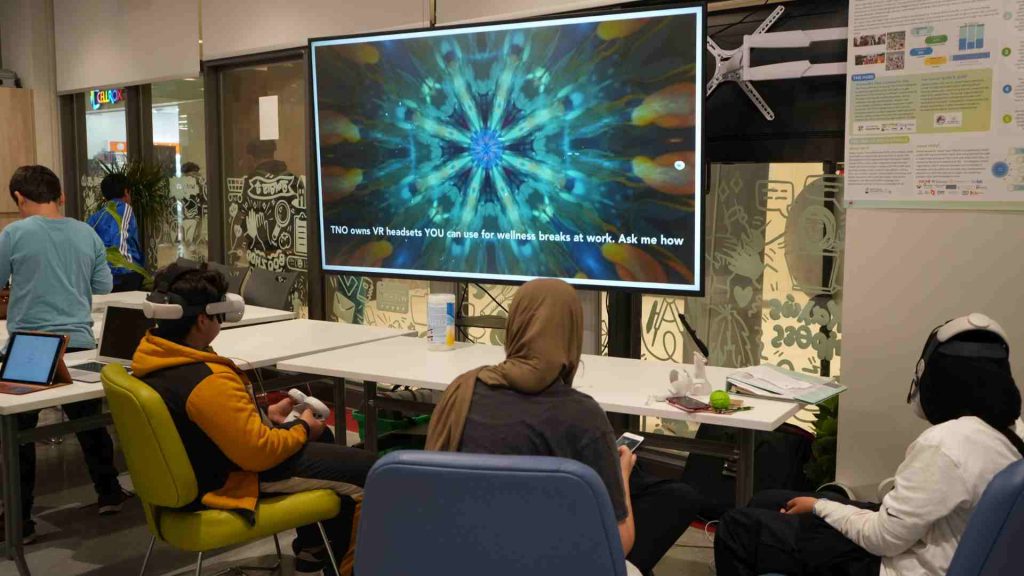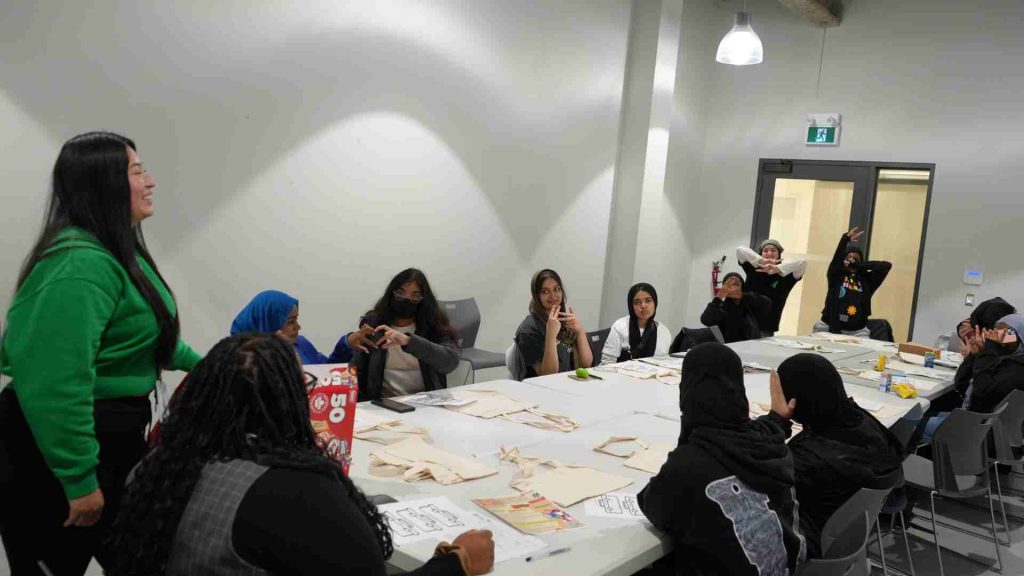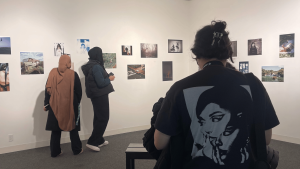Author : Cameron Murray. Cam is a community-based anthropologist and design researcher who currently works as a postdoctoral fellow in McMaster University’s School of Interdisciplinary Science and as an instructor in McMaster’s CityLAB program. He has recently kicked off an intergenerational research project, which marks a multi-year collaboration between McMaster’s Institute for Research on Aging and The Neighbourhood Organization. Cam has been working as a researcher and consultant with TNO on various projects in 2018.
As we finish 2024 and step into 2025, it’s the perfect time to reflect on the victories, both big and small, that we’ve achieved since the official launch of the Thorncliffe Park Youth Wellness Hub.
The youth hub presents a unique opportunity to reconcile past challenges, embrace present opportunities and imagine more equitable and collaborative futures for holistic youth wellness in East Toronto. It’s an understatement to say that the youth hub has met the lofty, if somewhat uncertain, expectations that were core to feelings of excitement, anticipation and anxiety when the ribbon was officially cut in August of 2023.

Fast forward to the one year anniversary celebration in September of this year and one cannot help but deeply and sincerely feel that this place is both a powerful and adaptable space that can meet diverse youth where they are in life. It’s a space driven by a desire to care with, not for, youth, where the expertise of staff is balanced with a deep appreciation for the complex lived experiences of the people it is meant to serve.

Designed in consultation and collaboration with Thorncliffe Park youth themselves, the Thorncliffe Park Youth Hub represents what design researchers like me call a “heterotopic” space. Unlike utopian spaces, which are impossible to realize ideals, a heterotopia is a real space that brings together the messy and challenging realities of diverse communities. These are spaces driven by an embrace of uncertain futures and a reminder that everyone’s personal story deserves to be told.
A heterotopia is also an honest space that does not shy away from the imperfect realities of what people in specific communities are going through. It meets challenges head on and recognizes the importance of perpetual change when it comes to the programs, services and spaces provided to an always-changing population.
August 17 was a truly momentous occasion for the Thorncliffe Park community, The Neighbourhood Organization (TNO) and a range of community health and social service providers. Launching the youth hub was the culmination of years of hard work and a uniquely fearless approach to collaborative grassroots design. At the same time, the event was a reminder of the heavy expectations weighing down on this new facility.
The buzz I felt walking into the launch event in August was visceral. I’ve been to a lot of similar events to launch new hospitals, research facilities and recreational spaces. Never before I’ve I been hit with such a sincere and palpable sense of joy and accomplishment. Throughout the event, MC’d by two local youth, we heard about the powerful combination of grit, design and motivation that brought this space to life.

In his opening remarks, Ahmed Hussein, TNO’s CEO, immediately emphasized the vibrancy and colour of the facility, speaking both literally and metaphorically. “This,” he said, “is the result of hard work, patience and collaborative support.” The undertone of his and other speakers, however, highlighted a kind of inspirational impatience to get things moving. A representative from the City of Toronto highlighted a similar tension in his remarks. Taking in the space, eyes wide, with a big grin on his face, he exclaimed “Wow!” multiple times before beginning his brief remarks. For him, hubs like this are spaces of connection, but he also made clear that how those connections are made is not predetermined.
The Youth Hub, he suggested, needed to simultaneously become a “one-stop shop” and a flexible, adaptive space. Noting the long history and struggle leading up to this launch, he ended by simply saying, “The city’s expectations are very high,” before closing with a quote from Nossal Gustav, the Austrian-Australian biologist: “Community leadership is the courage, creativity and capacity to inspire”.
Representatives from the Daily Bread and the TDSB echoed similar sentiments. This is what made the launch event so powerful. It wasn’t a hollow kick-off for something predetermined. It was a packed room full of local youth, politicians, residents, architects, community leaders and activists all agreeing to start a long, winding, uncertain journey with one another.

Looking back on the launch event and the progress already made since last August, it’s important to keep in mind the truly innovative model of mental health at the core of the Youth Wellness Hub. Again, I’ve seen many facilities with grand ambitions falter due to a lack of the depth and breadth of engagement I’ve witnessed in Thorncliffe Park. It’s easy to throw around concepts like “Holistic Integrated Health”, but there is a tangible earnestness to how this is being approached at Thorncliffe Park’s youth hub.
This is a place that truly appreciates the logic behind combining medical and mental health support, recreational programming and career development initiatives all in one place. These are all part of what it means for a youth, especially in underserved and marginalized communities, to learn to live well in all facets of life. Just a few snippets of conversations I heard at the launch event and in subsequent visits capture this sentiment perfectly: “Let’s create a new map of holistic youth support”. “Hope, resilience, and strength from the hearts and minds of local youth”. “Mental health is not merely a lack of mental illness”.
The design of the space itself evokes an openness to different perspectives and approaches. The guiding force behind everything is meant to empower youth to take control of their own health and wellness journeys, in their own words and on their own terms.
Just a couple months ago, the Youth Wellness Hub officially celebrated its one year anniversary. The celebration marked the most powerful and visible review of its progress to date. 119 youth signed up to attend the event, but closer to 200 showed up. There were lines winding around the entry door and an intensely palpable sense of excitement and sincere celebration. Once again, I’m reminded of similar launch and anniversary events I’ve attended, where the spirit of celebration is not necessarily forced but feels a bit rote and mechanical. The people who attended this one year anniversary could not contain their feelings of positivity and comradery.

Just taking one look at wide shot photos of the space flooded with happy faces, and up close images of individuals and small groups engaging in a variety of activities, is enough to know that the youth hub is, at least for now, succeeding.
The anniversary was also an opportunity to inform youth who had yet to visit or take advantage of programs and services about what might be available to them. This is a great recruitment strategy, especially for indirectly helping youth from different backgrounds to learn about sometimes challenging mental health and wellness supports in the context of an uplifting community celebration. The students learned about a range of health, wellness, recreational and employment programming while engaging in a dynamic range of activities.
They created impressive wall art and origami. They engaged with an interactive wellness advice bulletin, themed around the idea of “leave a tip, take a tip.” They explored the power of peer support by collaboratively building a word cloud poster. They made buttons and, my personal favourite, spun an “emotions and mindfulness” wheel. They even had a chance to explore simple woodworking and virtual welding activities, and played “program jeopardy.” These, among other activities and giveaways, are fantastic examples of meeting East Toronto’s youth where they are.
This one year celebration was a powerful way to remind ourselves that acknowledging the importance of simple pleasure and group interactions can be a fantastic way to begin more challenging conversations around the social, cultural, economic, emotional and psychological challenges facing youth in TNO-supported communities.

As 2024 winds down, Thorncliffe Park’s Youth Wellness Hub has come a long way and has a long way to go. It still exists as a liminal space. In art, psychology, architecture and science, liminality refers to spaces and experiences of transition. To experience liminality is to confront moments and spaces that operate “in-between” the past, present and future.
A liminal space can feel uneasy and empowering all at once. Liminal spaces present feelings of discomfort, but also help motivate us to imagine more vibrant and equitable futures. This is something worth embracing. Because of the way it was designed and built, the youth hub in Thorncliffe Park is uniquely suited for allowing service providers and local youth themselves to truly build that uncertain future together.
Now officially one year and four months old, I’m optimistic that the youth wellness hub has truly become a space founded on a spirit of mutual knowledge, interest and accountability. We can think of the youth hub as a powerful trading zone. A trading zone is a space of opportunity where people, service providers and other institutions, with differing perspectives and motivations, find common ground with one another.
The youth hub can and should serve this role for Thorncliffe Park, as long as existing and future programs and services are designed from the bottom-up. More than a space, the youth hub needs to be viewed as a symbol of Thorncliffe Park’s commitment to ensuring all youth have access to dynamic and interactive approaches to education, recreation, health and wellness for years to come.




